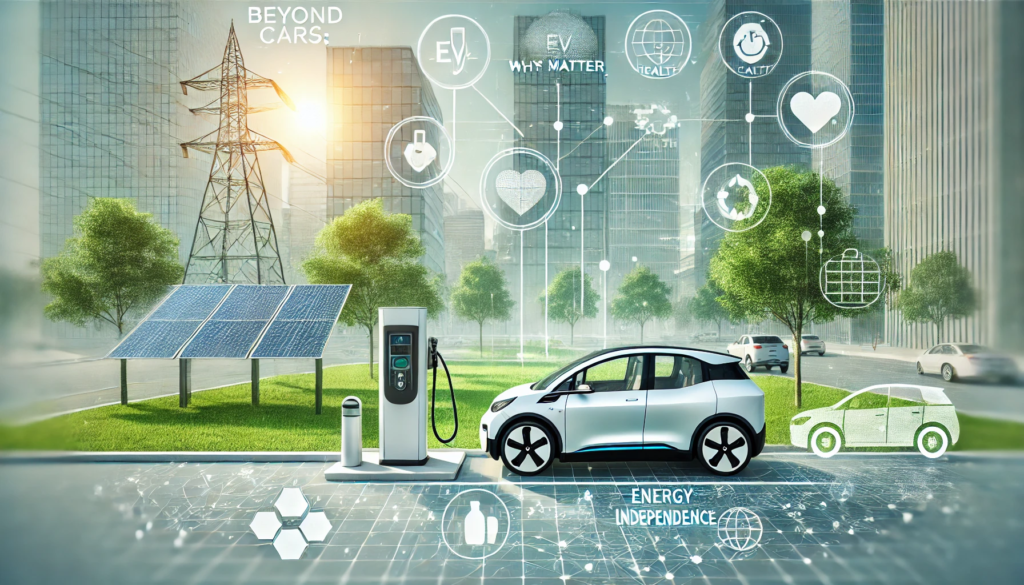My friends and family often wonder why I’m so obsessed with EVs. To them, it seems like an unlikely fascination as I’ve never been a car enthusiast. Growing up, cars were just a way to get places—no different from a bus or a bicycle. I never cared about horsepower, flashy models, status symbols, or acceleration. They were utilitarian machines: functional, necessary, but mostly uninspiring.
But EVs changed everything for me. They’re not just about futuristic designs or gadgets (though those are great); they’re about freedom and disruption. EVs represent a break from over a century of accepted norms and social constraints—from the relentless reliance on oil to the notion that personal transportation must always come at the cost of the environment and our health and well being. EV’s on the other hand, embody freedom from fossil fuels, outdated systems, and the opportunity to shape a more sustainable, self-reliant future.
Another key transformation is how people approach buying cars today. The general public faces a steep learning curve on how to manage an EV. People who once bought cars based on brand loyalty are now buying technology. Priorities have shifted from engine performance to battery range, charging networks, and software capabilities. This marks a significant change in consumer mindset, making EVs a symbol of progress and often representing pinnacles of technological innovation.
Freedom from the Gas Pump
Owning an EV means no more trips to gas stations or fluctuating fuel prices. With EVs, you can charge at home, fast charging stations, at malls, pole chargers, or even use a standard power socket. Paired with solar panels, you can refuel for free using clean energy. This isn’t just convenience; it’s empowerment to take control of your energy needs and break free from fossil fuel monopolies.
Freedom from Oil Wars
For over a century, oil has shaped geopolitics. Nearly every major war in the last century has been linked to oil—from World War I to the Gulf Wars. This dependency has destabilized regions and created global vulnerabilities. By transitioning to renewable energy, EVs reduce the geopolitical power of oil, paving the way for a more peaceful and sustainable world.
Freedom to Generate and Share Energy
The rise of Vehicle-to-Grid (V2G) technology takes EV empowerment to the next level. V2G allows your EV to act as a mobile battery, storing energy and feeding it back into the grid when needed. Imagine your car not just as transportation but as a critical part of a resilient, decentralized energy system. In the near future, this technology will give households grid independence, enabling them to power their homes during outages or sell energy back to the grid. This isn’t just freedom from the pump—it’s freedom from the constraints of centralized energy systems.
Health Benefits
EVs don’t just improve air quality; they directly improve public health. ICE vehicles emit harmful pollutants like nitrogen oxides and particulate matter, which are linked to respiratory illnesses, cardiovascular diseases, and premature deaths. Cleaner air from widespread EV adoption could reduce these health risks, lowering healthcare costs and improving overall quality of life. According to studies, tailpipe emissions contribute to over 4.2 million premature deaths globally each year.
Job Creation in New Industries
The EV revolution is creating jobs in advanced manufacturing, renewable energy, and battery technology. New roles in battery recycling, solar installation, and EV maintenance are replacing traditional oil and gas jobs, fostering a more sustainable economy.
Battery Recycling and Circular Economy
The disinformation merchants often like to obfuscate and steer the conversation toward an imaginary shortage of critical battery metals or the child mining of cobalt in the Congo. This completely ignores the massive societal mining costs that the fossil fuel economy has extracted from our world and continues to extract. Remember the Exxon Mobil oil spill or the BP Deepwater Horizon disaster, with both costing billions to remedy and leaving irreparable repercussions.
The rise of EVs fosters innovation in battery recycling, transforming waste into valuable resources. Companies are already developing closed-loop systems to recover lithium, cobalt, and nickel from used batteries, reducing the need for new mining and making EVs even more sustainable in the long run.
EVs as Emergency Power Sources
EVs with bi-directional charging can provide power during blackouts or natural disasters. In the U.S., Ford’s F-150 Lightning has already been used to power homes during outages, while many Chinese EVs come equipped with V2G as a standard feature. This capability provides critical resilience and energy security, becoming increasingly vital as climate-related disasters grow more frequent and severe.
Noise Pollution Reduction
EVs are much quieter than ICE vehicles, reducing noise pollution and improving urban living. Quieter streets reduce stress, improve sleep quality, and enhance overall well-being. Moreover, EVs are transforming once busy, pollution-filled traffic corridors into clean, quiet areas with significantly increased real estate values. Cities adopting EVs, like Oslo, have seen remarkable improvements in quality of life.
A Paradigm Shift in Mobility
EVs are not merely an upgrade to the internal combustion engine; they are a complete reimagining of transportation. The ICE age shaped modern urban planning, economies, and geopolitics. EVs represent the end of that era and the beginning of something far more sustainable. This shift doesn’t just change how we drive—it changes how we design cities, produce energy, and structure economies.
A Symbol of Progress
The ICE age once symbolized freedom, but today it feels outdated. EVs represent innovation and the courage to embrace cleaner, smarter systems. Paired with advancements in artificial intelligence, EVs are poised to lead another revolution: the rise of Transport as a Service (TaaS). With AI enabling autonomous driving, EVs will transform mobility by making it more accessible, efficient, and cost-effective. TaaS has the potential to reduce car ownership, alleviate urban congestion, and further decouple transportation from fossil fuels. As the world transitions to renewables, EVs stand as a beacon of progress, driving sustainability and change.
Empowering the Individual
By generating your own energy through solar and charging your car independently of oil companies, you gain energy freedom. V2G technology allows EVs to stabilize grids, provide backup power, and enhance community resilience. EVs aren’t just vehicles—they’re a cornerstone of sustainable energy systems, enabling the world to transition from traditional base load power to dynamic systems based on supply and demand.
The Future is Electric
As ICE vehicles are phased out and battery technology advances, EVs are revolutionizing industries and economies. With smarter grids, cleaner cities, and renewable energy integration, EVs drive sustainability and innovation, solving critical challenges for a better future. Beyond individual benefits, EVs also facilitate the electrification of entire supply chains, reducing emissions at every step. Furthermore, their integration with decentralized energy systems enhances resilience, ensuring that future cities and industries can adapt to evolving environmental and economic pressures. By acting as the nexus between technology, infrastructure, and sustainability, EVs lay the groundwork for a transformative future.
EVs: The Catalyst for Change
So no, while a car is just a car, an EV is not just a car—just as a car wasn’t merely a faster horse when it first disrupted mobile transportation. An EV represents a whole new way of thinking, fueled by the convergence of multiple transformative technologies. Innovations like the internet, renewable energy sources such as wind and solar, brushless motors, lithium batteries, and AI have been decades in the making, and their synergy is now reshaping our world. EVs matter immensely because they shatter the limitations of the last 120 years and even further back to an era where scarcity began to dictate economic models. They are catalysts in our transition from scarcity-driven systems to a new age of hyperabundance.
EVs redefine how we move, consume energy, and build resilience. They empower individuals while driving a sustainable and equitable future. They are not just about transportation—they are about transformation, touching every facet of how we live, work, and interact with our environment.
For me, it’s not an obsession—it’s a recognition of what EVs symbolize. They are a movement, a revolution, and a glimpse into a future where technology and sustainability work in harmony. EVs are more than vehicles; they are the keys to unlocking a cleaner, smarter, and freer future. That’s why they matter.


